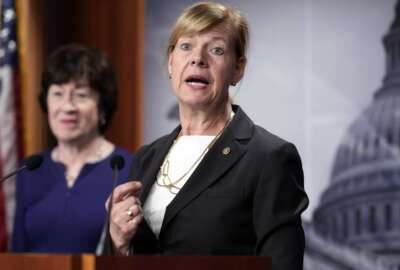President Barack Obama and Republican challenger Mitt Romney squared off in a nationally televised debate Wednesday night, attempting to sway voters by delineating their differences on the major issues facing the U.S.
The meat of these differences came out in how they would reduce the federal deficit. Former Massachusetts Gov. Romney called for cutting the federal workforce through attrition, while President Obama touted efforts he’s already enacted to trim $50 billion in waste from government spending.
Romney said tackling the deficit was not just a critical issue, but a moral one as well.
“I think it’s, frankly, not moral for my generation to keep spending massively more than we take in, knowing those burdens are going to passed on to the next generation, and they’re going to be paying the interest and the principal all their lives,” he said. “And the amount of debt we’re adding, at a trillion a year, is simply not moral.
Romney did not see raising taxes as a solution to this problem, saying that it would slow the rate of growth. ” I want to lower spending and encourage economic growth at the same time,” he said.
He proposed a simple test for deciding whether a government program should be cut. “Is the program so critical it’s worth borrowing money from China to pay for it? And if not, I’ll get rid of it. Obamacare’s on my list,” he said. Also on that list is stopping the subsidy for the Public Broadcasting Service.
Romney said he would make the government run more efficiently by combining some departments and agencies and cutting staffing through attrition.
President Obama pointed to cuts his administration had made in areas like defense spending and education as examples of his approach to deficit reduction.
“We went after medical fraud in Medicare and Medicaid very aggressively, more aggressively than ever before, and have saved tens of billions of dollars, $50 billion of waste taken out of the system,” he said, adding that he’s worked with both Democrats and Republicans to trim $1 trillion in spending from the discretionary domestic budget.
Obama referred voters to the Office of Management and Budget’s website, where they can review the specifics of his $4 trillion deficit reduction plan.
“And the way we do it is $2.50 for every cut, we ask for $1 of additional revenue, paid for, as I indicated earlier, by asking those of us who have done very well in this country to contribute a little bit more to reduce the deficit,” he said.
Romney’s economic plan, in which he calls for a “Smaller, Smarter, Simpler Government,” can be found on his website.
Mission of the federal government
Obama and Romney also offered clear differences in how they defined the role of the federal government.
“The first role of the federal government is to keep the American people safe. That’s its most basic function,” Obama said. “… But I also believe … the federal government has the capacity to help open up opportunity and create ladders of opportunity and to create frameworks where the American people can succeed.”
He pointed to the National Academy of Sciences and the Race to the Top program as examples of places where investment by the federal government is helping to enhance people’s lives.
Romney said that the role of the government was to promote and protect the principles laid out in the Declaration of Independence and The Constitution.
“We have a responsibility to protect the lives and liberties of our people, and that means a military second to none,” he said. “I do not believe in cutting our military. I believe in maintaining the strength of America’s military.”
Romney also said he would protect the right of individuals to pursue happiness as they choose.
“What we’re seeing right now is, in my view, a trickle-down government approach, which has government thinking it can do a better job than free people pursuing their dreams, and it’s not working,” he said.
As evidence, Romney pointed to the 23 million people who are currently unemployed.
“The proof of that is 1 out of 6 people in poverty,” he said. “The proof of that is we’ve gone from 32 million on food stamps to 47 million on food stamps. The proof of that is that 50 percent of college graduates this year can’t find work.”
Legislative paralysis in Washington
Part of the President’s job is to work with Congress to enact laws and keep the government functioning. But with the current state of bipartisan gridlock in Washington, how would these candidates thaw the frozen legislative process?
As governor, Romney said he learned to get along with the Massachusetts legislature that was 87 percent Democratic. In Washington, he would try to find common ground between leaders of both parties.
“Republicans and Democrats both love America,” he said. “But we need to have leadership, leadership in Washington that will actually bring people together and get the job done and could not care less if it’s a Republican or a Democrat. I’ve done it before. I’ll do it again.”
In response, Obama said he would take ideas from anyone, regardless of their party, as long as those ideas were helping to make the middle-class stronger by creating opportunities.
“That’s how we cut taxes for middle- class families and small businesses,” he said. “That’s how we cut $1 trillion of spending that wasn’t advancing that cause.”
RELATED STORIES:
Romney’s private-sector approach to government includes realigning pay, downsizing workforce
The Obama Impact: Evaluating the Last Four Years
Copyright
© 2024 Federal News Network. All rights reserved. This website is not intended for users located within the European Economic Area.





